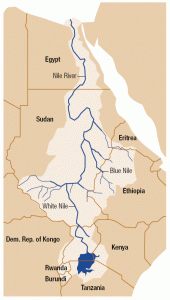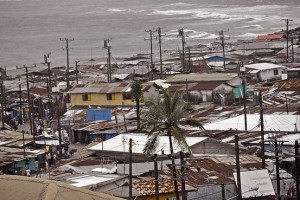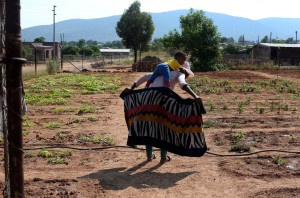As I was researching an interesting article other than one on the Ebola outbreak in West Africa, bombings in Nigeria or Kenya, I stumbled across a short speech in relation to African stereotypes. In one of her short speeches given at a Ted talk in 2009, Chimamanda Ngozi Adichie addressed a few of many of these misconceptions and its’ consequences Africans experience, not only within the continent, but also abroad.
Chimamanda Ngozi Adichie is a well renowned Nigerian novelist. Her works have been translated in 30 languages and is a role model of mine. Unknowingly many of us may have heard her voice in Beyonce’s single ”flawless” where she including an excerpt of the author defining the term “Feminist”. In this video, Chimamanda gives the audience an insight on the troubles she faced as a young Nigerian girl, evolving without any figure she could relate to within the Literary world.
” I was an early reader, and what I read was British and American children books ” she states as she begins to recollect her early childhood in Nigeria. Learning about different cultures and countries is great, however, it becomes a problem when these foreign depictions are the only ones being told, which in turn causes the child to not fundamentally grasp his/hers capabilities. I often hear local Liberians say “that’s for white people” when activities mostly seen and done by Westerners are invoked despite the fact that they may have the same if not better abilities.
The absence of relatable figures is a hinderance to the development of a child’s imagination and subconscious that will amplify during adulthood if it is not destroyed. Without knowing any better, these young minds mature with dream-like ideas of the Western world. The author states “Because all I had read was books in which characters were foreign, I had become convinced that books by their very nature had to have foreigners in them, and had to be about things in which I could not personally identify.” This is a sad reality I’ve personally witnessed. Breaking down to some of the young local children in Monrovia that they can actually become whomever, do whatever and transcend is often difficult. It is as if my claims are so farfetched from the truth. As a result, they only take my words with a grain of salt, while nodding their heads out of respect.
The question at hand is who is to blame for this? Who is responsible for this lack of education and opposite stereotyping from both ends? As Chimamanda states, only one story in Literature has been told throughout the history of this continent; that of a poor, miserable, deadly, primitive Africa. This is precisely the dangers of a single story and what many fail to realize: just like literature, mainstream media outlets such as CNN, BBC and others are the ones primarily televised in these regions of Africa.Therefore, the viewers not only perceive a glorified version of America but those who do not know any better only see the negatives of Africa, a crippled view of Africans, and thus a tarnished vision of themselves.
After moving to America for college, she faces a different type of challenge. The higher-level educational institutions where one’s vision and understanding of the world is meant to flourish suffers severely from the one side of a story syndrome. She recalls, “The professor told me that the characters were too much like him, an educated and middle-class man. My characters drove cars, they were not starving, therefore they were not authentically African.” If individuals with such distinctions cannot imagine an African resembling themselves, then who are children to speculate such travesty?
Indeed, the youth will only imitate, and believe what they are taught. This ignorance is indeed is widespread disease. “My American roommate was shocked by me. She asked where I had learned to speak English so well and was confused when I said Nigeria happened to have English as their official language” states the novelist. This statement is one that I, and millions of Africans in various locations of the globe are familiar with.
Questions such as “ do you have electricity in Africa?”, “are there roads?”, and my all-time favorite statement “ you do not look African” become standard, even in this day and age. “I come from a conventional middle class Nigerian family. My father was a professor, my mother was an administrator.” Although she may have come from a normal average household, to many Americans, it is almost unfathomable that common cars exist, putting her upbringing at an unimaginable thought. This is primarily due to the fact that there still aren’t many stories, films and pictures depicting the reality of the real African lifestyle in mainstream media. Having solely learned about safaris, the continent’s beautiful houses and mansions, immense sky-scrappers and most importantly, its’ refined, intellectual and civilized groups of people seem to have lost it’s way to major news outlets: proof of the perpetual cycle of stereotyping.
Abidjan, La Cote d’Ivoire at night
Chimamanda delivered an honest, genuine, account of her experiences with stereotyping. I believe the platform she spoke on, TED talk, allowed her to give such a truthful speech. I do not think other media stages such as CNN would permit her to express herself as freely, without trying to steer her toward their goal. Many of the terms she employed (and we studied in class ) such as “pity”,”dying in poverty”,”catastrophe”,”aids”,”darkness” would still be used but in a completely different context.
Nonetheless, I hope one day I would not have to specifically mention where Liberia is when asked about my origins, because almost no westerner I met here knew where it was (before the Ebola outbreak). I am confident one day, when I tell my adopted teenage sisters that living in America is not the utopia they have heard of, they will not look at me as if I’ve completely lost my mind. I pray for many more billionaires such as Nigerian Aliko Dangote, Nobel peace Prize winners like Liberian Ellen Johnson Sirleaf and Oscar winner Lupita Nyong’o, so that the mediocre stereotypes associated to such an amazing collection of people is forever destroyed.
Link:http://www.ted.com/talks/chimamanda_adichie_the_danger_of_a_single_story?language=en#t-488506
















 Source: http://www.cnn.com/2014/09/01/world/africa/ebola-ghost-town/index.html?hpt=iaf_t2
Source: http://www.cnn.com/2014/09/01/world/africa/ebola-ghost-town/index.html?hpt=iaf_t2